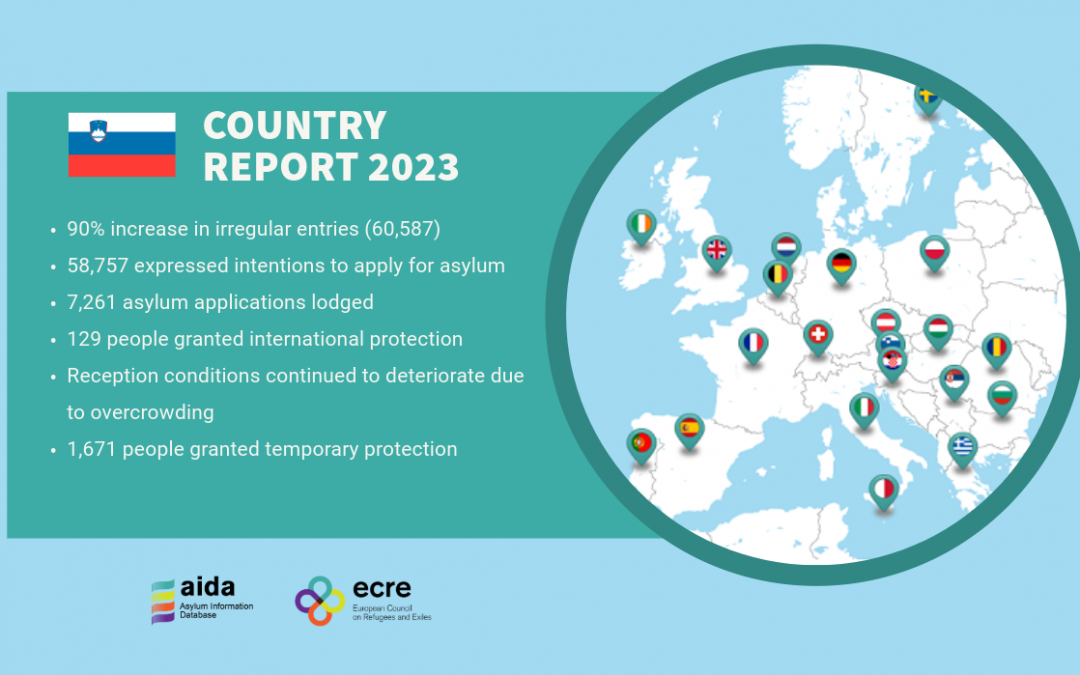The updated AIDA Country Report on Slovenia provides a detailed overview of legislative and practice-related developments in asylum procedures, reception conditions, detention of asylum seekers and content of international protection in 2023. It also includes an annex which provides an overview of temporary protection (TP).
In 2023, Slovenian police recorded 60,587 irregular entries, a 90% increase compared to 2022. The most common countries of origin of people apprehended for irregular border crossings were Afghanistan (17,825) Morocco (8,859), Pakistan (5,176) and Russia (3,631). 58,757 people expressed their intention to apply for international protection, an 87% increase compared to 2022, but only 7,261 applications were lodged. 129 applicants were granted international protection, including 74 refugee statuses and 55 subsidiary protections. Of the 55 applicants who were granted subsidiary protection, 52 were Ukrainians. 294 applications were rejected (43% protection rate at first instance). The Administrative Court did not grant international protection to any applicants in 2023.
Regarding Dublin transfers, in 2023, Slovenia sent its largest number of requests to date (4,776), including 3,489 to Croatia. During the year, Slovenia carried out 17 transfers to other EU member states (MS) (mainly Croatia) and received 181 people from other EU MS (mainly Germany). It also carried out 256 transfers under readmission agreements with neighbouring countries, including 176 to Croatia. In 2023, the EU Agency for Asylum (EUAA) was deployed in Slovenia for the first time and provided support with asylum, reception and temporary protection-related activities.
Regarding the asylum procedure, delays and backlogs at first and second instance continued to be a major issue, with the Administrative Court sometimes only issuing a decision after two years.
Reception conditions continued to deteriorate throughout the year as a result of overcrowding at the Asylum Home in Ljubljana. This prompted the Government to announce at the beginning of 2024 that it planned to establish two additional temporary reception centres. Although legislation providing for the systematic separate accommodation of unaccompanied minors had been adopted in 2023, delays in its implementation meant that unaccompanied minors continued to be housed in the same facilities as adults. The first reception centre for unaccompanied minors eventually became operational in April 2024 but issues relating to the identification of unaccompanied minors by the police as well as the lack of age assessment procedures being conducted in practice have meant that children are still living in the same facilities as adults.
In 2023, 22 asylum seekers were detained and faced difficulties reaching refugee counsellors in order to apply for judicial review of their detention by the Administrative Court. Alternatives to detention are still not available in Slovenia.
In 2023, 1,761 people, including 1,714 Ukrainians, applied for TP. Slovenia granted TP to 1,671 people. Backlogs have been reduced and, in 2023, decisions on TP applications were issued within 30 days on average. The main issues faced by TP beneficiaries continued to be access to healthcare, which is limited to urgent treatment, risks of exploitation and human trafficking, and a shortage of accommodation options. TP beneficiaries are still unable to exercise the right to family reunification in practice.
The full report is available here and the annex on temporary protection is available here.
For more information about the AIDA database or to read other AIDA reports, please visit the AIDA website.

